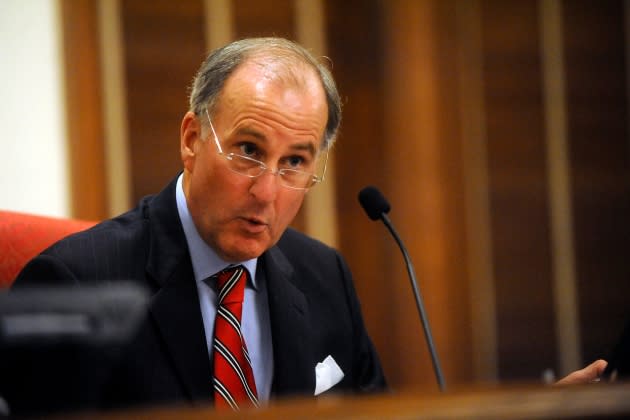Abortion in North Carolina Hinges on Just One Republican Keeping Their Word
- Oops!Something went wrong.Please try again later.

When he was running for reelection to North Carolina’s House of Representatives this past October, Rep. Ted Davis gave an interview to the New Hanover County Republican Party. “What is your stance on abortion here in North Carolina — are you going to outlaw it completely?” his interviewer, Reuel Sample, asked.
Calling abortion “a very personal, moral issue,” the Wilmington Republican said, “I believe in the [existing] law. … If a woman desires to have an abortion up to 20 weeks, which is the second trimester of pregnancy, she can have an abortion. But after that, I believe in reasonable restrictions. Those reasonable restrictions are rape, incest, unviable fetus, or danger to the health of the mother.
More from Rolling Stone
“[M]ost of the women that I have talked to, who have come up to me and told me that they heard my stance,” Davis added. “They support that position.”
Davis was absent last week when his fellow Republicans threw their weight behind legislation that would cut in half the amount of time most women have to obtain an abortion in North Carolina, while simultaneously saddling abortion seekers and providers with onerous obligations that will dramatically complicate the process.
He is one of four North Carolina Republicans who promised voters they would not support the kind of extreme abortion restrictions that were negotiated in secret and brought to a vote with less than 24 hours notice and no period for public comment. If even just one of those four lawmakers keeps their word, North Carolina’s existing abortions laws — which allow terminations through 20 weeks — would remain in place.
Gov. Roy Cooper, a Democrat, has pledged to veto the legislation — which has been approved by North Carolina’s General Assembly, both chambers of which are controlled by Republicans — this Saturday. Republicans in the state Legislature are expected to attempt to override that veto next week. A single GOP defection would allow Cooper’s veto to stand.
Davis, reached for comment, declined to say whether he will vote to override Cooper’s expected veto — despite his previously stated opposition to the bill’s restrictions.
Rep. Tricia Cotham — who campaigned as a pro-choice Democrat before switching parties last month — is another of the lawmakers who told voters she would oppose such restrictions. Cotham co-sponsored a bill to codify the protections of Roe v. Wade earlier this legislative session. There’s also Rep. John Bradford, who represents Mecklenburg County, which Biden swept by more than 35 points. He said in October, “I have no intentions, myself, of going back to Raleigh and trying to make the 20 weeks more restrictive.” And then there’s Sen. Michael Lee, who declared in a September op-ed, “I am against bans in the first trimester.”
Rolling Stone reached out to Cotham, Bradford, and Lee for comment on their past comments and the looming decision. None of them responded.
The new ban would outlaw medication abortion, the method that accounts for nearly 60 percent of North Carolina abortions, at 10 weeks, but would require women seeking a medication abortion to attend three in-person appointments, each 72 hours apart. These new and medically unnecessary appointments will be burdensome for all women, but especially for those forced to travel to North Carolina from Southern states with even more restrictive bans in place. (One analysis found that the rate of abortion in North Carolina spiked by almost 40 percent after the Dobbs decision.) Those women will either have to remain in the state for more than a week, or travel there multiple times, a logistical and financial challenge for women who work or have children.
Tripling the number of appointments per patient and dramatically shortening the window in which those appointments can take place will increase the burden on the state’s medical providers as well. Already, says Jenny Black, CEO and president of Planned Parenthood South Atlantic, there are long wait times for any type of appointment: “It’s going to choke an already very constrained system.”
Under the new law, abortions would be illegal after 12 weeks in all but a limited set of circumstances: rape, incest, “life-limiting abnormalities,” or to save the life of the mother (from physical threats to her health only; the law does not allow exceptions for life-threatening mental or emotional distress).
The law could also force clinics that provide surgical abortions to acquire licenses to operate as “ambulatory surgical centers.” Planned Parenthood currently runs six health centers in the state; none meet those requirements today.
Beyond the obvious consequences, Black is worried about unforeseen implications of the law, the text of which was only public for 24 hours before it was first put to a vote: “We’ve been scrambling trying to understand what is in it and feeling, just speaking for myself, a little worried that there might be something in here that we’re missing — that could have grave implications for us — because of the way that this was rammed through so quickly.”
With only a few days left before the vetoed legislation heads back to the General Assembly for the override vote, Democrats and advocates are ramping up the pressure on Republicans. On Wednesday, Cooper was rallying with doctors in Wilmington — Ted Davis’ district — just as a new ad from Planned Parenthood hit the airwaves there. “The Speaker [of the House, Tim Moore] does not tell me what to do,” Davis says in one clip, referring to abortion legislation. “I’ll vote to keep it the way it is.”
Best of Rolling Stone
